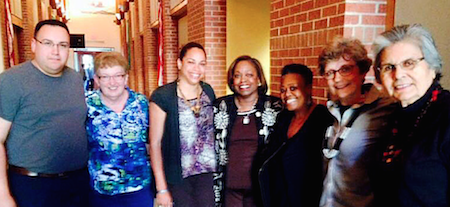June 5, 2015

Some of Fitchburg’s new committee appointees (from left to right) Jason Gonzalez, Jeanie Sieling, Mariam Maldonado, Frances Huntley-Cooper, Sabrina Madison, Arlene Silveira and Ada Deer. Photo: Kaleem Caire
“If we have accurate representation, solving our problems in a way that treats everybody fairly becomes a lot more automatic, it doesn’t become this Herculean struggle,” said Mayor Arnold.
Fitchburg Mayor Steve Arnold made clear during his campaign earlier this year that diversity and inclusion would be a top priority. Recent appointments to important city committees shows he aims to keep that promise.
At a late-May meeting, Arnold and the city’s common council appointed the most diverse group of board and committee members in Fitchburg’s history.
New member appointments of people of color include:
- Mariam Maldonado, who was appointed to the Fitchburg Police and Fire Commission and who also currently works for the Urban League as workforce development manager;
- Zulma Franco, who was appointed to the Library Board and currently serves as a Madison police officer;
- Arlene Silveira, former Madison Metropolitan School District board president; and Sabrina ‘Heymiss Progress’ Madison, a motivational speaker, columnist, and social entrepreneur, were both appointed to serve on the Board of Community and Economic Development Authority;
- Ms. Ada Deer, former Assistant Secretary of the Interior and Director of the United States Bureau of Indian Affairs under the Clinton Administration, will now serve on the Commission of Aging.
In addition to these appointments, Dr. Elton Crim, Jr., a professor in the School of Education at the University of Wisconsin-Madison, was appointed to the city’s Joint Review Board to assist in the approval of a tax incremental financing district.
For Arnold, who was elected to his first term as mayor in April after serving as a city alder, increasing the city’s minority representation is the right thing to do.
“Whether it’s new or not, it’s the way it should be,” he said. “Local government should provide opportunity for everyone and you can’t do that unless everyone is represented.” But he’s also realistic: “We’ve succeeded to a certain extent, but we’ve still got a long way to go before our staff looks like our city.”
Located just outside Madison, Fitchburg is home to about 26,000 residents. Its population is growing, particularly with Blacks and Latinos, who currently make up about 30 percent of residents.
The city has a lot to offer in terms of entertainment and commerce. Its family-friendly atmosphere and natural surrounding beauty are just a couple of its amenities. However, these positive qualities are not always equally enjoyed by everyone, particularly its most diverse residents.
New appointee to the Community and Economic Development Authority, Sabrina Madison — who also goes by Heymiss Progress and writes the Ask Progress column for this newspaper — remarked that she has felt unwelcome or suspect in certain places, such as the library. “People — patrons, not the library staff — will look at you funny, like you’re not supposed to be there,” she said.
To her, not being able to enjoy all that Fitchburg has to offer comes down to access to the city’s amenities. She identifies a lack of transportation and the city’s strategies (or lack thereof) for reaching out to diverse groups as the biggest contributors to unequal access.
“The lack of access to certain spaces or events for communities of color and other folks has not necessarily been omission by design, but rather omission by ignorance,” she said.
The Community and Economic Development Authority works to improve issues surrounding housing and community development. On behalf of the city, it carries out community development programs, including a housing rehabilitation program, neighborhood reinvestment and administration of the city’s housing rehabilitation program, among others.
Lack of Access at Issue
Madison sees a lack of awareness about the lives and needs of underrepresented communities and that underscores the importance of diversity of the new city appointments.
“You need to have voices at the table who can say ‘This is what we need, this is what’s been missing,’” she explained. “Part of my work (with the Community and Economic Development Authority) will be networking and getting these committees connected to certain organizations — the Urban League Young Professionals, the YWCA, etc. — that they may not have previously been connected to.”
“There have been a lot of efforts in the city towards developments [in events, entertainment and employment], but if the community doesn’t know about them or isn’t able to get to the new developments, it doesn’t do any good,” she continued.
Having city leaders who reflect and represent the lives and interests of all of its residents is the first step in addressing problems, said Arnold.
“The most important thing is that the more diversity of origins and life experiences, the greater the diversity of ideas and thus, the better the solutions to our problems will be,” said Mayor Arnold. “If we have accurate representation, solving our problems in a way that treats everybody fairly becomes a lot more automatic, it doesn’t become this Herculean struggle.”
“We want to make sure that diversity and inclusion is at the forefront of every plan,” he said. “It will become automatic to the point that people won’t even have to think it about it, it will just be a given.”
With his new staff, Mayor Arnold is building a foundation from the inside out for Fitchburg to grow according to the needs and concerns of all of its residents, and is setting an example for other cities to do the same.
When asked what he has in store for the coming months, Arnold said: “I have a lot of plans. Filling the boards is the first thing. Then you’ll start to see more of the initiatives. I urge everyone to watch our city government closely.”

